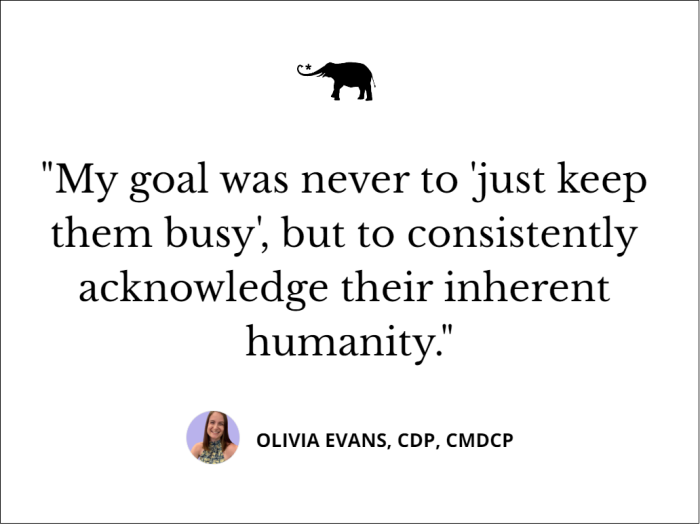If you’ve ever visited a nursing home, memory care unit, or assisted living facility, you’ve probably seen a mixture of bingo, trivia, movies, and art. Each of these “activities” does have some value, but I want to challenge dementia caregivers (both personal and professional) to think bigger. I want all of us to reframe our thinking that an “activity” is in a boring room, with bad lighting, no interaction, and silence. I worked as a Life Enrichment Director at a 72-person capacity memory care assisted living and my goal was never to “just keep them busy”, but to consistently acknowledge their inherent humanity. Once I got to know my residents intimately, I tailored our months to exactly what they wanted: joy.
In the first year alone, we went to bowling alleys, art galleries, museums, an animal rescue, music concerts, the beach, coffee shops, a soup kitchen, a butterfly garden, the movie theater, ice cream and candy shops, a preschool and Montessori school, wine tasting, fishing, sledding, the park, farmers markets, recycling centers, the driving range, a sunflower farm, a municipal airport, leaf peeping, and pumpkin picking.
The key to my success in engaging individuals living with dementia can be distilled into a simple yet profound concept: joy and purpose.
Why is it important to know as much as you can about the individual? We had a resident who experienced moments of agitation, so we devised a solution that tapped into his past professional life. We presented him with math and spelling tests to correct and grade, pretending they were intended for a local school. This therapeutic approach, known as a fiblet or therapeutic non-truth, not only resonated with his pre-dementia identity but also gave him a sense of purpose. He channeled his energy into work that held great value for him and the hand dexterity and mental exercise involved served as additional benefits.
The challenge with memory care does not lie in the inability of those living with dementia to engage in meaningful activities; rather, it lies in our failure to provide them with the appropriate environment and resources for successful participation. The biggest constant with dementia is change, so knowing how and when to modify or adapt activities for your person is key. For instance, as the principal’s dementia progressed, we may have needed to simplify the tests or provide him with an adaptive pen.
If you’re feeling uncertain about how to engage someone living with dementia, consider the following suggestions as a valuable starting point:
- Sensory exploration: Dedicate each day to a specific sense and plan an activity that aligns with it. This could be as simple as going outdoors and identifying various shades of green or counting the sounds of birds. Such low-energy and restful activities can serve as a wonderful counterbalance to more energetic parts of the day.
- Social interaction: Research local free activities or events taking place near you, such as those hosted at senior centers, community centers, or libraries. These opportunities encourage social engagement and connection.
- Physical well-being: Explore online exercise videos, try chair yoga or seated pilates, or add some fun by tossing towels into a laundry basket.
- Spiritual nourishment: Take the time to comprehend what holds significance to the individual, whether that’s watching religious services online, engaging in conversation with a chaplain, singing hymns, or volunteering at their place of worship.
- Mental stimulation: Keep a ready supply of crossword puzzles or word searches, allowing the person to be engaged without constant supervision. This empowers them to embark on spontaneous activities on their own while giving you a break.
- Transforming daily care: Recognize that even seemingly mundane or routine tasks can be transformed into engaging experiences. Whether it is washing the dishes, setting the table, or matching up socks, infusing intention and purpose into these activities can create meaningful interactions.
Engaging activities support the brain’s communication pathways, help keep a steady routine, promote your person’s sense of self, build strong connections, decrease symptoms of the disease, and provide caregiver respite.
Remember that success doesn’t mean that the task is completed with full accuracy, but rather that the person was accommodated appropriately and personally. When the principal completed grading the tests, his corrections weren’t important. What truly mattered was his sense of accomplishment and purpose.
We should all begin to demand higher standards of engagement for those living with dementia, never forgetting that dementia does not obliterate a person’s essence—they remain present, awaiting the spark of joy we have the power to ignite.












Read 0 comments and reply